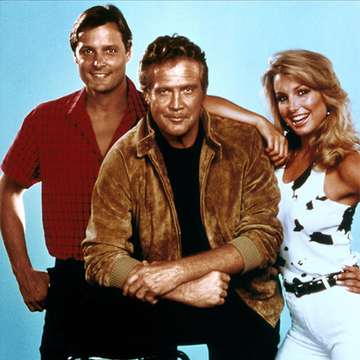It should be no surprise that Time named Donald Trump as 2016's Person of the Year. An August cover of the weekly magazine featured a stylised cartoon of the President-elect's face melting as if it were the subject of a Salvador Dalí painting. After a gaffe or five, an October issue reused the image, depicting Trump as a puddle of orange and yellow. But the final meltdown never came. By the morning of 9 November, for better or worse, Trump had solidified his place in history—and in pop culture.
Ten years ago, Time chose another controversial "person": You, the collective users of the Internet. The two choices feel undoubtedly linked. With all sides of the political spectrum propagating Trump's messages of racism, misogyny, and xenophobia—either through direct endorsements or indirect signal boosting through ironic retweets or finger-wagging responses—it seems as if Time's 2006 Person of the Year—You, and maybe Me, too—helped elect the man who earned this year's honor.
Time defended its 2006 choice by saying there were no "great men" on whom to bestow the honor. "To be sure, there are individuals we could blame for the many painful and disturbing things that happened in 2006," wrote Lev Grossman. Leaders in North Korea tested nuclear weapons. Our President kept troops in Iraq. Our Vice President shot someone in the face. Instead, Time decided to give the average Time reader—albeit the ones who were regular Internet users—a pat on the back. "It's about the many wrestling power from the few and helping one another for nothing and how that will not only change the world, but also change the way the world changes," Grossman continued.
Twitter launched just nine months before Time named its 2006 Person of the Year. Founder Jack Dorsey told the L.A. Times in 2009 that the team chose the name "Twitter" because it meant "a short burst of inconsequential information." Every post is built upon the belief that someone out there cares what you have to say. In 140 characters or less, users can share anything—there's no filter to winnow the chaff. To an optimist, it's a pure democracy. To a pessimist, it's a lawless anarchy. If everyone's voice is heard, is anyone really listening?
A decade later, people are listening—to Donald Trump, that is, arguably the first presidential candidate who truly understood how to use the medium to his utmost advantage. He nailed reality TV, after all, and it seems like amassing a legion of fans to piggyback on his racist, misogynist, and xenophobic rhetoric was a logical next step. The place to do that? The Internet. And who got involved? Everyone—from the casual white supremacist with an egg avatar to the aspiring comedian who retweeted Trump's rants with his witty comic commentary. All sides of the political spectrum propagated his message, and it seems as if Time's 2006 Person of the Year—You, and maybe Me, too—helped elect the man who earned this year's honor.
With the help of social media, our modes of communication are more fractured than ever. Twitter, at best, is a cocktail party (albeit one in which strangers scream at each other); at worst, it's an endless debate that every participant believes he or she has won (and it serves as a convenient place to attack women, members of the LGBTQ community, and people of color).. Over on Facebook, our newsfeeds have become echo chambers that reflect how and what we feel through the funhouse mirrors of our friends' status updates and political screeds—just slightly different enough to encourage arguments in the comments. If the many are taking power back from the few, as Grossman asserted ten years ago, then the end results have left our country as fractured as ever. The power remains in the hands of the elite while the many continue to argue with each other online.
There's a clichéd argument to make about how our smartphones have destroyed our ability to communicate over the past decade or so. While the way we catch up has changed, our communication skills haven't eroded over the Web's lifetime. While we communicate in-person less frequently, we're still connected. If anything, we're too connected.
But wasn't this the point of the Internet? Its earliest iterations were designed to connect government and military institutions to facilitate communication across geographic boundaries. In a sense, then, bemoaning the Internet is no different than bemoaning the telephone. Both were expressly designed, at their very core, to make it easier to talk to someone who wasn't within earshot.
In a way, the online world isn't so different from the real world. We use it to mourn. We use it to celebrate. We use it to waste time and do absolutely nothing. The lines between the online and "real" worlds have blurred considerably over the past decade. Recently, the intersection of the two has become frighteningly apparent with the explosion of fake news. Formerly relegated to dark corners of the internet, fake news has seeped into legitimate political discourse. Trump himself frequently indulges in Internet conspiracies, tweeting recently a(n unfounded) claim that millions of votes had been cast illegally.
So did we deserve it? Did we, the collective users of the Internet, deserve to be named Person of the Year 2006? Given our self-centeredness, it makes sense we'd put ourselves on the level of past honorees like Gandhi, Queen Elizabeth II, and Pope John XXIII.
But are we, as users, "great?"
Not quite. When the Internet came along, we didn't suddenly become great people. The Internet just gave us a place to indulge the worst parts of our nature. We could hide behind shield of perceived anonymity and hurl insults—or, if we're so bold, put our profile picture where our mouth is.
Internet users didn't deserve to be Person of the Year 10 years ago, and we most certainly don't deserve it now. We are nasty, brutish, and grammar-averse. Ten years out, Trump seems the most logical extension of that choice. He's a wannabe media critic and an SNL hate-watcher. He's deleted tweets because of spelling errors. He spends more time on social media than he does, presumably, creating policy. In a sense, he's one of "You." He knows how to use the Internet to his advantage using it to rile up supporters and take detractors to task. He's a composite portrait of the worst parts of the Internet—the racist, misogynist, and xenophobic bits, with a little celebrity worship thrown in.
Time's 2006 pick was (and is still) mocked. It felt like a cop-out. But 10 years later, it stands as an eerily prescient choice, a harbinger of the ills to come. "Web 2.0 harnesses the stupidity of crowds as well as its wisdom," Lev Grossman wrote in 2006. "Some of the comments on YouTube make you weep for the future of humanity just for the spelling alone, never mind the obscenity and the naked hatred."
But just how stupid? Only time would tell.














